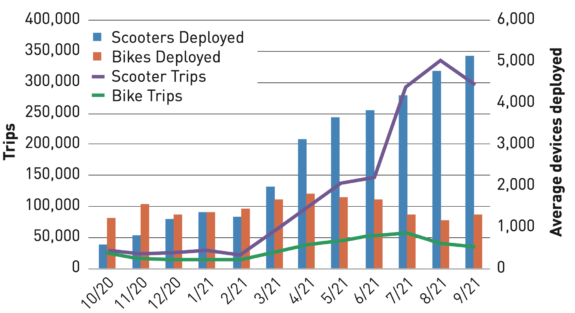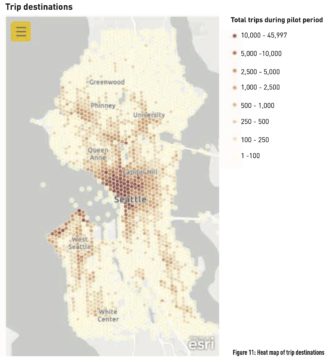
Spin and Wheels have not received permits to operate in Seattle under the city’s 2022–2023 permit, SDOT announced. But for the first time, scooter company Bird will operate here.
LINK scooters have retained their permit, as have Lime’s scooters and bikes. The most recent entrant into Seattle, Veo, has also retained its permit for its bikeish-scooters.
SDOT says it selected the permits based on each company’s “commitment to safety, community engagement, and continual improvement.” From the SDOT Blog:
All three of the selected companies submitted robust proposals detailing their commitment to safety, community engagement, and continual improvement, as well as considering the needs of other people traveling on streets, sidewalks, bike paths, and trails.
The selection was difficult, and we are grateful for Wheels and Spin, two current scooter companies that will not continue operating in Seattle, for the transportation service they provided between 2020–2022.
We are issuing three permits at this time. We may issue an additional permit to another company in the future if we see a good opportunity to benefit the public.

People took more than 1.4 million trips on shared scooters and bikes between October 2020 and September 2021, a figure that is likely to increase as more destinations fully reopen and the number of events grows. The top trip destinations were crowded areas like downtown or busy business districts, SDOT noted in their pilot permit summary. The average scooter trip was 15 minutes, traveled 1.4 miles and cost $6.63.
A portion of the fees collected from scooter and bike services help fund an adaptive cycling program the city hosts in partnership with Outdoors For All in Magnuson Park, providing people a chance to ride accessible cycles designed to work for people with many different disabilities.
Spin and Wheels will have “a few weeks to wind down their operations,” SDOT wrote. It will likewise take Bird a few weeks to get up and running.








Comments
5 responses to “City announces new scooter and bike share permits: Spin and Wheels are out, Bird is in”
“The average scooter trip was 15 minutes, traveled 1.4 miles and cost $6.63.” This is a little surprising, isn’t it? You can walk 1.4 miles in 20-25 minutes for free. And $6.63 is far more than bus fare, which is another alternative. With the new higher pricing, it’s not clear how competitive this is, is it?
Scooters and shared bikes looked more attractive to use when they were cheaper because they were subsidized by cheap VC cash, but I’m not sure about their prospects at the prices the businesses will have to charge to make a profit. We’ll see, I guess.
I’l use them if I’m running late for something and walking would be a bit too slow. It’s too pricy to replace transit for me, but between that and rideshare I’ll take the scooter/e-bike.
Yeah, the prices seem outrageously expensive. Is there a discount for lots of trips? If so, I can’t find it. If you take a dozen trips a month, you are spending quite a bit of money. Even weekly trips seem expensive.
In contrast, consider some similar size cities for bike share (not scooters). Portland: $8.25 a month ($100 a year), for an unlimited number of trips. Boston, $120 a year. Vancouver, $130 a year. All of these are run by the city (or some public agency). They all look a lot better, in terms of bike availability, from what I can tell. (I’m pretty sure Boston has a great system, not sure about Portland and Vancouver.)
We really took the wrong approach here. We abandoned public bike share, figuring the private market would give us cheap prices and quality service. It has provided neither.
We need to change our approach, and do what other cities have done: consider bike share an important part of public transportation. They complement other forms of public transit (buses and trains) that thankfully are publicly owned. The bike share system should be run by a public agency (or non-profit, like in Minneapolis) along with a relatively small amount of public subsidy (along with private sponsorship, like Nike in Portland). We should have a lot more docks in most of the city, with dockless only in the low density outskirts.
Wheels were motorcycles disguised as scooters and their typical rider behaved like your typical car driver. They will not be missed. I’m shocked SDOT set some standards when it comes to motorized vehicles on non-motorized infrastructure.
The most serious issues are safety and clutter. There have been many injuries. Dock-less devises are often parked without discipline and block sidewalks, curb ramps, and bus stops. They interfere with passage by pedestrians, seniors, handicapped, and bus riders. The net seems negative.